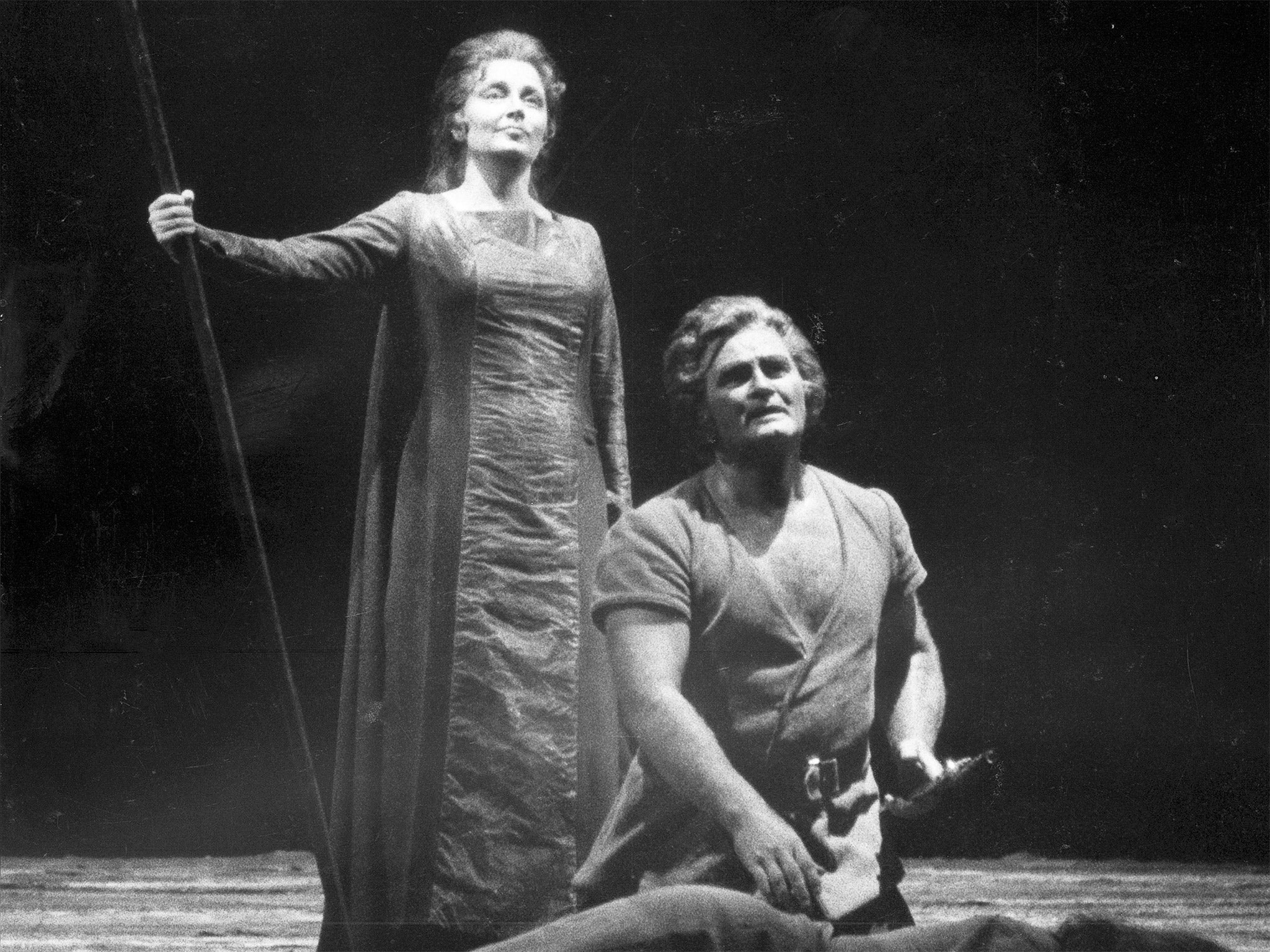Jon Vickers: Heroic tenor with an inimitable sense of drama who threw himself into roles with instantly recognisable conviction
Vickers was a true heldentenor, intense and heroic in both voice and character

Of the Canadian tenor Jon Vickers, who has died aged 88 "after a prolonged struggle with Alzheimer's disease", according to a family statement, the critic Richard Osborne has written in Gramophone magazine: "The Vickers voice was instantly recognisable; no one sounded remotely like him. Such comparisons as were made, were made with Caruso" – a view reiterated by many other commentators, including Andrew Porter and John Steane, both without peer in their knowledge of the world of opera and of its singers.
Vickers was a true heldentenor, intense and heroic in both voice and character, and of imposing appearance. Often this was controversial, as in his portrayal of Britten's Peter Grimes, a characterisation the composer hated when he heard it at Covent Garden the year before his death. Here was no poetic dreamer, an outsider among the village fisherfolk, but a rough fisherman – a bruiser almost – harbouring much anger and frustration. A far cry from Peter Pears, for whom Britten had specifically written the role.
"If, sometimes, he went over the top", wrote Alex Ross, "it was never merely for effect; the excess came from a surplus of conviction." Indeed, his performances – and sometimes his acceptance (or otherwise) of a role – were always the result of personal moral consideration. In 1977 he withdrew from performances of Wagner's Tannhäuser at Covent Garden and at New York's Metropolitan Opera because, in his view, the opera was blasphemous: "It denied everything that I believed in and everything on which I've founded my philosophy of life."
Of Tristan and Isolde he said: "They were not nice people … It may be a great love story between two quite horrible human beings."
Jon Vickers was born in Prince Albert, Saskatchewan, Canada, sixth of the eight children of a devoutly religious family. He sang as a boy in the church choir, which sometimes serenaded inmates of the local penitentiary, and worked in local retail stores until, aged 24, he obtained a scholarship to Toronto's Royal Conservatory of Music, where he studied under the English baritone George Lambert.
He trained for five years, making his debut in 1952 with the Toronto Opera Company and in 1957 was at Covent Garden, 1958 Bayreuth, 1959 Vienna State Opera, 1960 Metropolitan Opera and La Scala. At Covent Garden he sang the part of the King in A Masked Ball, conducted by Edward Downes: "The company has at last acquired a really successful Gustavus", said The Times; however, it continued, "he is inclined to force his tone, and he does not always budget for breath in long phrases, but he is plainly a most useful acquisition".
When he took the role of Don Jose in Carmen, his characterisation was so powerful and rich in personality that it was difficult to understand why Carmen should wish to reject him! But bringing out the drama more than the lyricism of Bizet's opera proved to be an exciting experience for the audience in a production that "glowed with life".
Next came one of the great roles for which Vickers will be remembered: Aeneas in The Trojans by Berlioz, conducted (as was Carmen) by Rafael Kubelik. As a real dramatic tenor, Vickers portrayed Aeneas heroically, rather than Virgil's "rather frigid Augustan". However, he paid a price for the unremitting drama, all in 1957, by withdrawing from a performance of Strauss's Salome on BBC Television owing to nodules on the vocal cords. He was back on stage towards the end of the year in Aida, but the critics still warned that "'Celeste Aida' should not be delivered as if it were Siegfried's forging song".
As well as Aeneas (recorded with Colin Davis), his other key roles were Florestan, Tristan, Siegmund and Othello (all recorded with Herbert von Karajan); and Peter Grimes (again with Davis). In addition to the operatic stage he appeared on the concert platform and in the recital room, being capable of the greater intimacy demanded by these circumstances and wonderful pianissimos to match.
Among his recordings was one of Handel's Messiah conducted by Sir Thomas Beecham in the controversial version rescored for full symphony orchestra by Sir Eugene Goossens. "You're damn good, Vickers," Sir Thomas is reported to have shouted, ruining a perfectly good take. He also recorded songs, such as Schubert's Die Winterreise, described as "searing" and, inevitably, dividing critical opinion.
Of present-day singing, he said: "We [now] have the cult of the personality. The personality now is using the art form, in my opinion, for personal glorification … We have become servants of our voices and our voices are no longer servants of our emotions, of our intellect, of our hearts.
"I consider myself a very humble, simple boy from a small town who loves the soil, who loves the farm, and I happen to be a singer. I do honestly believe that the genius of the performer dies with him, and there is nothing that can keep it alive – not films, not recordings, nothing."
GARRY HUMPHREYS
Jonathan Stewart Vickers, operatic tenor: born Prince Albert, Saskatchewan, Canada 29 October 1926; Canada Centennial Medal 1967; married 1953 Henrietta (Hetti) Outerbridge (died 1991; two daughters, three sons), 1993 Judith Panek Stewart; died Ontario 10 July 2015.
Join our commenting forum
Join thought-provoking conversations, follow other Independent readers and see their replies
Comments